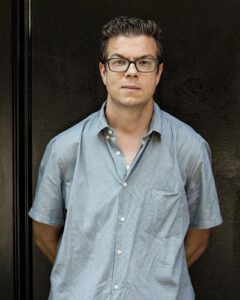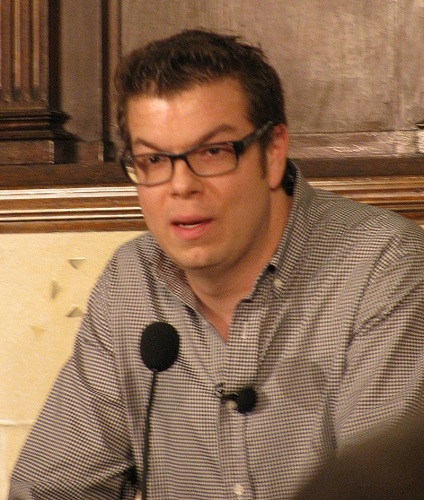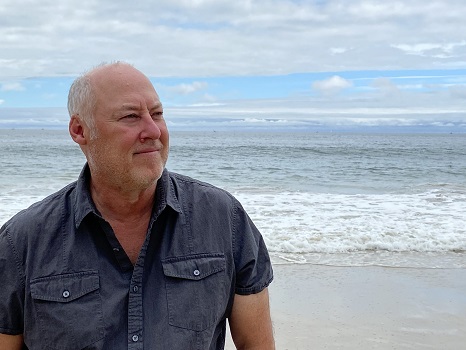De Amerikaanse dichter, schrijver, essayist en criticus Benjamin S. (Ben) Lerner werd geboren op 4 februari 1979 in Topeka, Kansas. Zie ook alle tags voor Ben Lerner op dit blog.
The predictability of these rooms
The predictability of these rooms is, in a word, exquisite. These rooms in a word. The moon is predictably exquisite, as is the view of the moon through the word. Nevertheless, we were hoping for less. Less space, less light. We were hoping to pay more, to be made to pay in public. We desire a flat, affected tone. A beware of dog on keep off grass. The glass ceiling is exquisite. Is it made of glass? No, glass.
Gather your marginals…
“Gather your marginals, Mr. Specific. The end
is nigh. Your vanguard of vanishing points has vanished
in the critical night. We have encountered a theory
of plumage with plumage. We have decentered our ties. You must quit
these Spenglerian Suites, this roomy room, this gloomy Why.
Never again will your elephants shit in the embassy.
Never again will you cruise through Topeka in your sporty two-door coffin.
In memoriam, we will leave the laws you’ve broken broken.”
On vision and modernity in the twentieth century, my mother wrote
“Help me.” On the history of structuralism my father wrote
“Settle down,” On the American Midwest from 1979 to the present, I wrote
“Gather your marginals, Mr. Specific, The end is nigh.”
l wish all difficult poems were profound.
Honk if you wish all difficult poems were profound.
Idle elevators of grain…
Idle elevators of grain. Plenty of parking. Deciduous trees
of the genus Ulmus, known for their arching branches and serrate leaves
with asymmetrical bases, Gunplay in our houses of steak,
houses of pancakes. Dried valerian rhizomes. Bunk weed. Osage.
Deliberately elliptical poetic works reflect a fear of political commitment after
1968.]
A fear of deliberately elliptical poetic works reflects…
Home considered as a System of substitutions: “Plenty of parking.
Deciduous elevators of the genus Gunplay,
known for their arching bases and serrate pancakes
with asymmetrical rhizomes.” The activation of the white space of the page
reflects a fear of the industrialization of print media.
To fear the activation of the white space of the page
is to fear poetry.
Idle elliptical commitment. Deciduous repetition. Plenty of parking.
Tegenlicht
Het licht dat verandert
het licht dat uitgaat
wanneer je eronderdoor loopt
Het onveilige kruispunt
en de spookfiets
Het licht dat een vlam blijkt te zijn
en de gloeilamp die zo is ontworpen
dat hij flikkert. Natuurlijk
stadslichten, de ketting
van lichten van bruggen, lichten van
vliegtuigen
horen er ook bij, vooral
als ze flitsen of
gedoofd zijn
Fopkaars
die vonkt op de taart, kleine ster
die vonkt, wintergroen
in de mond, de spraak
die bederft, flits
uit de lopen tijdens de jacht op
Victor Serge over de daken
De sneeuw blauw in het licht
en de brandende manuscripten
en Parijs, de stad van
het licht dat verandert
in de mond
die ik graag had gekend
je was een liefhebber van licht
ik zou wat voor je hebben bewaard
Maanlicht op de stoep dat ik
opzij had gezet, in fabrieken
in gevangenissen, natuurlijk
en het brandende Moskou natuurlijk
in de strot liet ik
een licht voor je aan, Victor Serge
in de vorige eeuw, eeuw van de laatste
sigaretten, het licht
dat bederf afgeeft, het koude
licht van het levende
organisme
in de open
zeeën, in Oakland, een paar
oude schilderijen. Omdat het net
als as
wordt verstrooid, dacht ik dat ik kon
zingen
Omdat het herhaaldelijk sterft
in Mexico, zonder een cent
Zonder een cent in Spanje
dacht ik dat ik op foto’s
openhartig met je zou kunnen
spreken
Als ik verschijn heb ik natuurlijk
geen cent, want verschijning is
de laatste uitweg
van licht
Victor Serge
in zijn brieven, in vertaling
Onze liquidatie is voorbereid
en als ze je naam roepen
zijn mijn handen gebonden, is mijn rol beperkt
tot het breken door
glas, tot glas de gelegenheid geven
licht om hoekjes te buigen en om
doorzichtige vleugels, espejitos
heten ze in het Spaans, maar Spanje
was verloren
Spiegeltjes
waarvan de randen
ondoorzichtig zijn
Mag ik gewoon iets zeggen
over hoe alles verloren is
iets vanzelfsprekends over het gevaar
van lichtvervuiling en de noodzaak van donkere
oases, en als Serge kon worden
aangehaald, het voortplanten op constante
snelheid door ondoorzichtige voorwerpen zoals
deze bladzijden, of zou dat zingen
zijn, want net als as
wanneer je eronderdoor loopt
want net als sneeuw
blauwe systemen
Vertaald door Arthur Wevers

Ben Lerner (Topeka, 4 februari 1979)
De Amerikaanse schrijver Stewart O’Nan werd geboren op 4 februari 1961 in Pittsburgh, Pennsylvania. Zie ook alle tags voor Stewart O’Nan op dit blog.
Uit: Ocean State
“My mother’s boyfriends tried to be sweet, but they were strangers. Sometimes they paid our rent and sometimes we split it. When they broke up with my mother—suddenly, drunkenly, their shouting jerking us from sleep—we would have to move again. Like her, we were always rooting for things to work out, far beyond where we should have. Our father was gone, and our mother couldn’t stop wanting to be in love. “I swear this is the last time,” she’d say, dead sober, and a month later she’d bring home another loser. They seemed to be getting younger and scruffier, which Angel thought was a bad sign. My mother didn’t seem to notice. In the beginning, everything was new. She lost weight and kissed us too much and made promises she couldn’t keep. The last had been a deckhand named Wes who brought home lobsters and called her “Care” and took us to Block Island to ride bikes, until one night he smashed her phone when she
tried to call the cops on him. Neither of them was bleeding, so the cops didn’t charge anyone. “You guys are useless,” my mother said. “Yeah,” one of them said, “that’s why we’re here at one in the morning, cause we got nothing better to do.” We were living in the top half of a duplex, and the next morning while Wes was out dragging the Sound, the three of us lugged everything we could carry down the stairs and shoved it in my mother’s car.
The house by the Line & Twine was for sale, but in 2009 no one was going to buy it. My grandmother had worked in accounting with the owners, snowbirds who’d shipped off to Florida long before the Crash. Like most of the houses on River Road, it had been sitting empty for years. There was moss on the shingles and weeds in the gutters.
My grandmother came over to help us clean the kitchen. She brought her rubber gloves. “It’s not the Taj Mahal,” she said.
“It’s fine,” my mother said, as if we wouldn’t be there long.
“Angel Lynn. Quit with the face.”
“I didn’t say anything,” she said, scowling.
“You don’t have to.”
I didn’t say anything. I hardly ever said anything, afraid of making things worse. I watched them like a scorekeeper, silently recording every slight and insult, every failure to be kind. I was thirteen, and like all children, had an overdeveloped sense of justice. I wanted everyone to be happy, despite our actual lives.”

Stewart O’Nan (Pittsburgh, 4 februari 1961)
Zie voor nog meer schrijvers van de 4e februari ook mijn blog van 4 februari 2019 en eveneens mijn blog van 4 februari 2018 deel 1 en ook deel 2.


